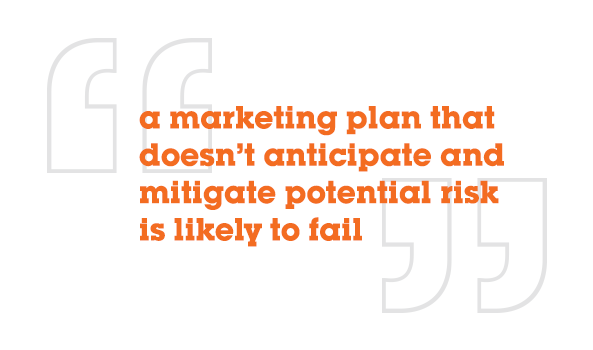Risky Business? Not if You Have a Plan
- 12.17.19
- 4 Min Read

Every business has a marketing plan. But not all business marketing plans give the desired results. What differentiates successful plans from those that crash and burn is the accuracy of assessment done during planning. And one of the most crucial assessments is the potential risk of the strategy.
What does that mean exactly? Well, despite months of preparing and execution, a marketing plan that doesn’t anticipate and mitigate potential risks is likely to fail. And knowing what risks to look for is a good place to start.
4 THINGS THAT COULD GO WRONG IN YOUR MARKETING PLAN
As it turns out, Murphy’s Law holds true when it comes to marketing strategies. Whatever can go wrong will go wrong. Therefore, the key to evaluating potential risk factors is taking an honest look at every aspect of the marketing plan and asking yourself, is there anything that can go wrong? If there is, assume that it will and mitigate it right away.
A standard marketing plan has four potential risk areas:
1. Identification of Target Markets
Miscalculation of target markets is the first step on a journey of marketing strategies that give dismal returns. Of course, this inaccurate assessment may not be realized until cash flows turn problematic.
Incomplete surveys of potential markets give inaccurate facts that lead to flawed conclusions. Your business wouldn’t have a complete picture of the challenges in the market and would not be able to position your product as the solution to these challenges.
2. Overestimation of Brand Relevance
You probably believe in your brand, but don’t take this as a representation of your brand relevance. A marketing plan that overestimates the relevance of a brand will fail to take into account the promotional efforts needed to build trust with potential customers.
3. Inaccurate Assessment of Trends and Regulations
Industry trends determine certain aspects of your marketing strategy. You should be able to assess your competitors and identify their winning strategies. Trends in technology and consumer preferences are key. Any misunderstanding in the assessment of these aspects will have a negative impact on your plan.
4. Lack of Tracking Marketing Strategies
Are your strategies paying off? Do you have a clear view of what went wrong in the past in order to do better going forward? If not, you are missing a crucial opportunity. This could put the success of your latest marketing plan at risk.

HOW RISK MANAGEMENT SUPPORTS YOUR PLANNING AND EXECUTION
Knowing there’s plenty that could go wrong, it’s imperative to have a risk management plan to anticipate issues and map out how your team will handle those issues when they occur. A well thought out risk management plan:
- Requires a complete survey of potential markets with an allowance for the time it takes to convert prospects into real customers. Not only does this give a clear picture of target markets, but it also eliminates the risk of underperforming cashflows due to high sale estimation.
- Accounts for extra time and promotional efforts needed to gain customers’ trust in the brand and create loyalty. It gives realistic timelines that account for the time it takes to convert various leads and positively affect cashflows.
- Takes a survey of current and future trends that will directly influence product performance. This ensures the products you put out are relevant and stand a fair chance regardless of various limiting factors.
- Assesses the performance of previous marketing strategies to identify what can be improved and areas that need to be avoided altogether. High risks often have high returns. Therefore, risk management is not always about eliminating risk; at times, you have to figure out how to get the most from a risky opportunity.
Risk doesn’t occur at the same time in all aspects of your plan. Sometimes, these risks are interconnected and occur as a ripple effect. Some risks are easy to predict and mitigate – others are not. However, being well informed and always having a plan is the only way to deal with all types of risks and ensure you have an effective marketing strategy.
Although creating a marketing risk assessment plan is not simple, it’s necessary. Consistency is key to achieving desired results. Regular efforts eventually pay off by having effective marketing strategies with tangible results.







